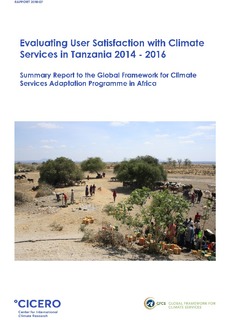Evaluating User Satisfaction with Climate Services in Tanzania 2014 - 2016: Summary Report to the Global Framework for Climate Services Adaptation Programme in Africa
Research report
Published version
Permanent lenke
http://hdl.handle.net/11250/2500793Utgivelsesdato
2018-06-07Metadata
Vis full innførselSamlinger
- CICERO Reports [210]
Sammendrag
This report summarizes findings from qualitative research undertaken by the Center for International Climate Research (CICERO) and the University of Dar es Salaam (UDSM) in Tanzania between 2014 and 2016 under the Global Framework for Climate Services Adaptation Programme in Africa (GFCS-APA). This research has aimed to support the programme’s internal monitoring and evaluation efforts by establishing a baseline and conducting follow-up research aimed at understanding how potential users of climate services at the local, district and national levels can be supported to access and apply climate information and services in decision-making concerning agriculture and food security, disaster risk reduction and management and health. Findings draw on interviews and focus group discussions with potential users and intermediaries of climate services in Kiteto and Longido districts, and key informant interviews with climate service co-producers, intermediaries and users at local, district and national levels. Following the approach taken in the baseline report, we assess the ‘usability’ of both scientific climate information and services and indigenous knowledge in relation to user perceptions of the credibility, salience, and legitimacy of this knowledge, also known as the knowledge system criteria (Cash et al., 2003, Tang and Dessai 2011). Findings from research conducted in 2016 are presented in relation to qualitative indicators and sub-indicators of “user satisfaction” that were developed and applied in the baseline report (Daly, West and Yanda, 2016). The indicators address respondents’: perceptions and experiences of institutional coordination and steering mechanisms for delivering climate services across scales (indicator 1); awareness of and access to climate information and service channels (indicator 2); satisfaction with the information and services developed and received (indicator 3), and views and experiences concerning the role of indigenous knowledge (IK) about the weather, climate and related adaptation options (indicator 4) in local decision-making processes. The findings suggest that while efforts at co-producing user-oriented climate services under the GFCS-APA have strengthened institutional coordination and steering mechanisms for climate services development at the national level and enhanced awareness of and access to climate information and service channels amongst some stakeholders, access to salient, credible and legitimate climate information and services remains highly uneven at the local level. Disparities in levels of basic service provision, mismatches in the timing and resolution of seasonal forecasts, and difficulties in understanding and translating forecast information into actionable advice, continue to undermine the usability of scientific climate and meteorological information within and across villages in the two districts studied. Gender roles and gendered disparities in literacy in some cases further undermine women’s abilities to access climate services and constrain their ability to understand and interpret climate information. Despite these limitations, respondents at the local level generally consider scientific information about the weather and climate to be potentially “useful” information that can complement traditional forecasts and local and indigenous sources of knowledge about weather, climate and related adaptation options. However, the findings suggest that substantial barriers exist to coproducing, institutionalizing, scaling up and sustaining decision-driven climate information and services that meet expressed stakeholder needs, that cut across sectors, and that are widely accessible and usable. The findings illustrate some of the challenges encountered to co-producing usable climate information and services within a multiagency climate services programme targeting diverse stakeholders and sectors. Consolidating and sharing learning from the pilot phase of the GFCS-APA will constitute an important first step towards developing more credible, salient and legitimate processes for co-producing usable climate services going forward. With this in mind we offer ten recommendations for enhancing user satisfaction with climate services in Tanzania in the future.
